This week: Mourning in Gaza and south Tel Aviv, asylum seeker solidarity, settlers protesting and protested against, activists arrested, tear gas returned, Bedouins marginalized, and separation roads traveled.
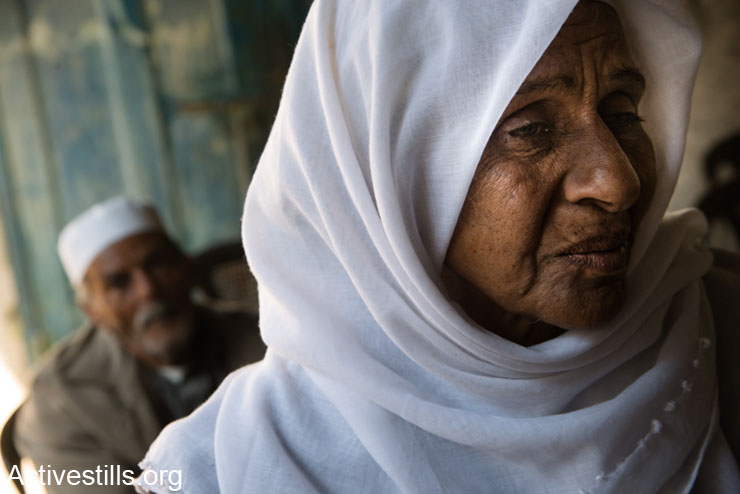
Amna (right) and Salman Mansour mourn their son Ibrahim who was shot and killed on February 13 by Israeli forces while collecting gravel near the border with Israel in the Al Mentar area of the Gaza Strip, February 17, 2014. A witness who was working with him at the time said that no warning was given before the single shot struck Mansour in the head. He was 35-years-old and leaves behind a wife and seven children. (photo: Ryan Rodrick Beiler/Activestills.org)
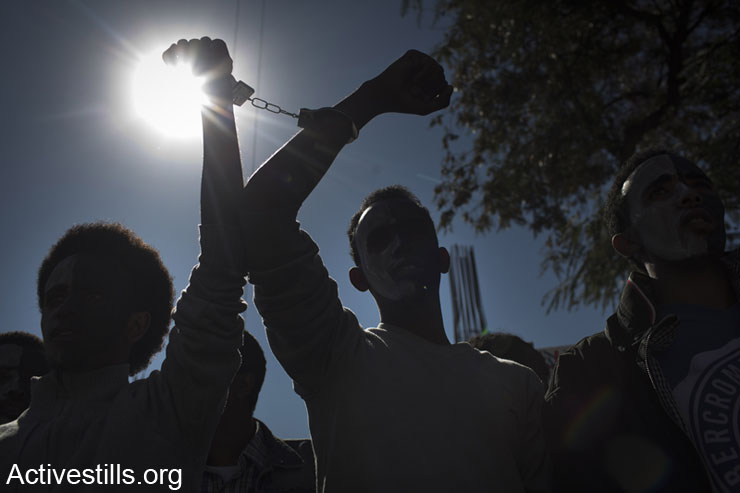
African asylum seekers shout slogans during a protest in front of the UN refugee agency (UNHCR), Tel Aviv, February 13, 2014. The demonstrators protested against the Holot detention center for African immigrants and called on the Israeli government to recognize their rights as refugees. (photo: Oren Ziv/Activestills.org)
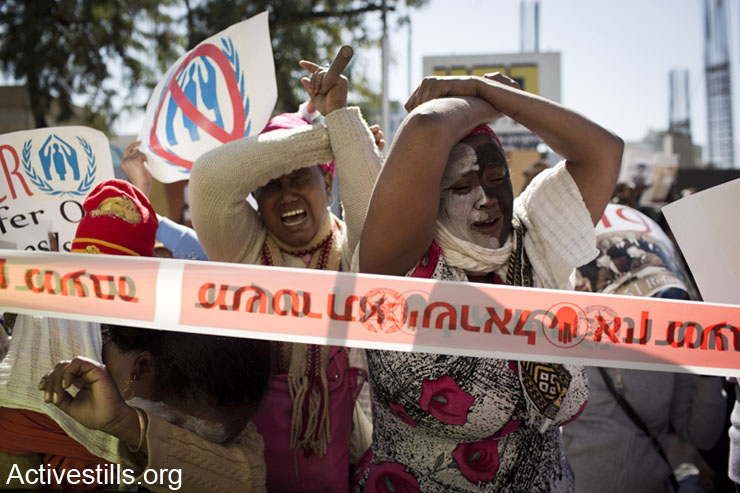
Women African asylum seeker cry during a protest in front of the UN refugee agency (UNHCR), Tel Aviv, February 13, 2014. The demonstrators protested against the Holot detention center for African immigrants, and called on the Israeli government to recognize their refugee rights. (photo: Oren Ziv/Activestills.org)
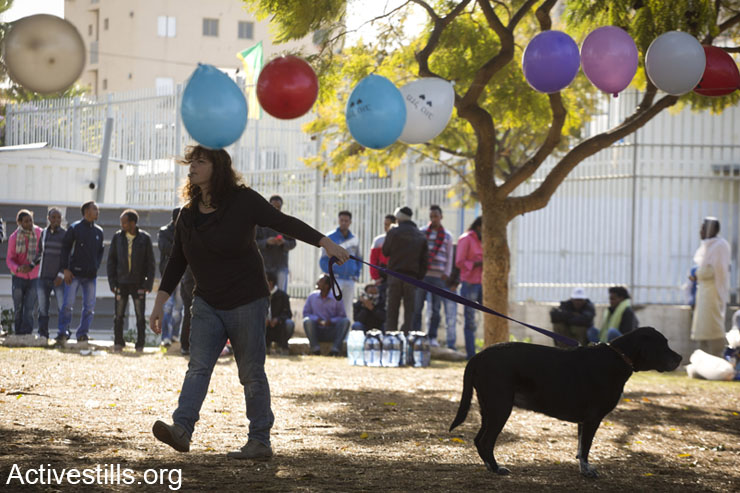
A protester whistles to disturb Eritrean Asylum seekers while holding a ceremony mourning their relatives, De Modina park, Shapira neighborhood, south Tel Aviv, February 15, 2014. Every Saturday, African asylum seekers from the Eritrean community gather in a small park to commemorate their loved ones who perished in Eritrea or in the Sinai desert on the way to Israel. Protesters organized a demonstration against the mourning ceremony, claiming the noise caused by the people disturbs them. Two neighbors who argued with the protesters were arrested by the police. (photo: Activestills.org)
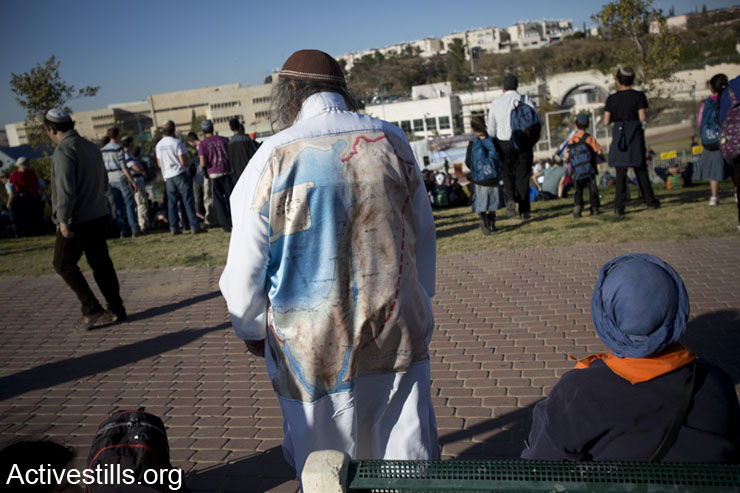
Israeli right-wing settlers protest before marching from Ma’ale Adumim settlement to the E-1 area on the eastern outskirts of Jerusalem, calling for an expansion of Jewish settlements in E1, February 13, 2014. Israel had planned construction in the area, but then refrained in the wake of international pressure in 2009. Further settlement construction in the area would effectively separate Palestinians in East Jerusalem from the West Bank. (photo: Tali Mayer/Activestills.org)
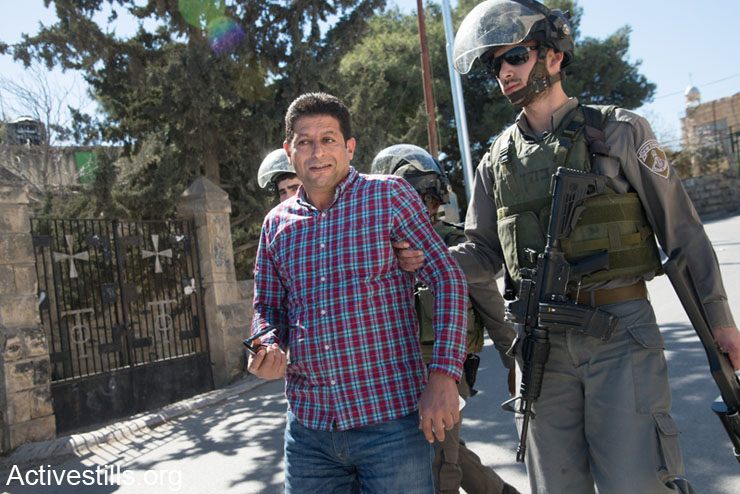
Israeli border police arrest Palestinian activist Mahmoud Zawahra of Al Ma’sara, a leader in the Popular Struggle Coordinating Committee, Al ‘Eizariya, West Bank, February 13, 2014. Zawahre was arrested while he was standing near his car at a meeting point of activists prior to a demonstration organized by the PSCC. After questioning him for about 30 minutes, he was taken away by a military jeep. (photo: Ryan Rodrick Beiler/Activestills.org)
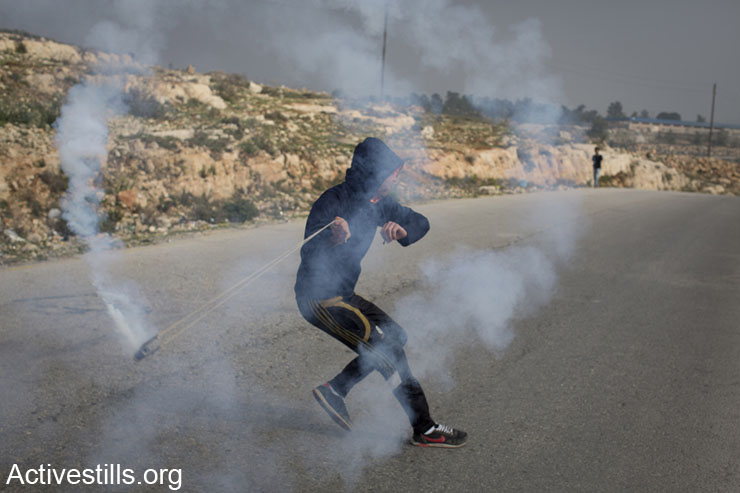
A Palestinian youth throws back an Israeli tear gas canister during the weekly protest against the occupation in the West Bank village of Nabi Saleh, February 14, 2014. (photo: Oren Ziv/Activestills.org)
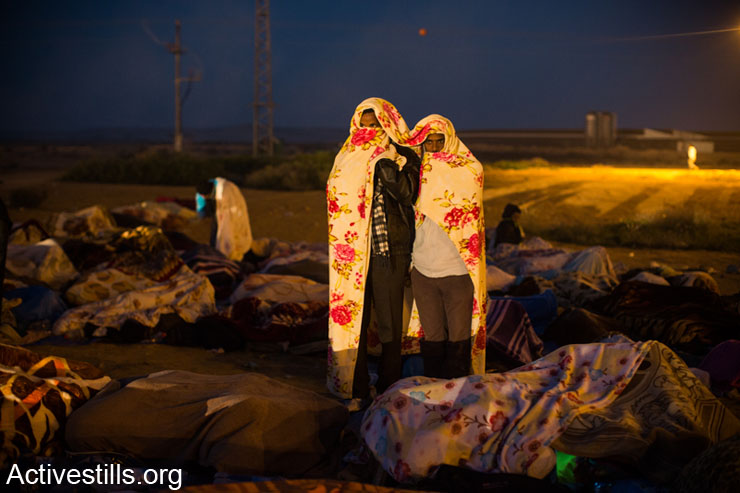
African asylum seekers cover themselves from the cold in the early morning hours of the second day of a protest outside the Holot detention center, in Israel’s southern Negev Desert, February 18, 2014. The protesters called for the closing of the prison and for the recognition of the refugee rights for African asylum seekers living in Israel. (photo: Yotam Ronen/Activestills.org)
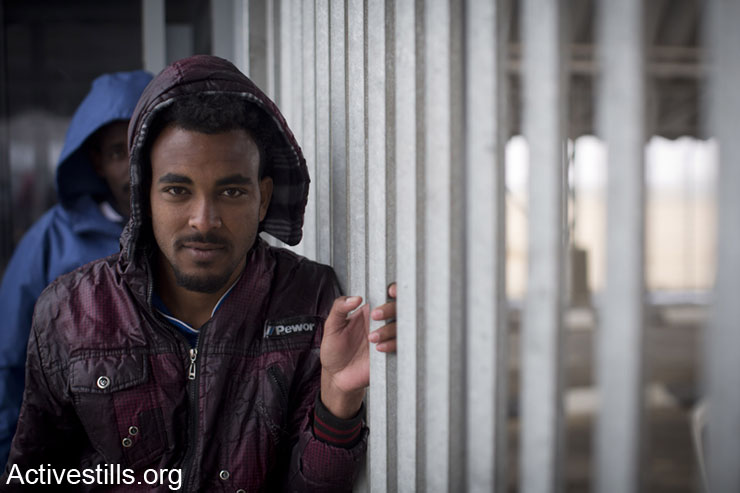
An African asylum seeker jailed in Holot detention center waits to re-enter the facility after meeting activists and friends who came for a solidarity visit, Negev, February 15, 2014. (photo: Oren Ziv/Activestills.org)
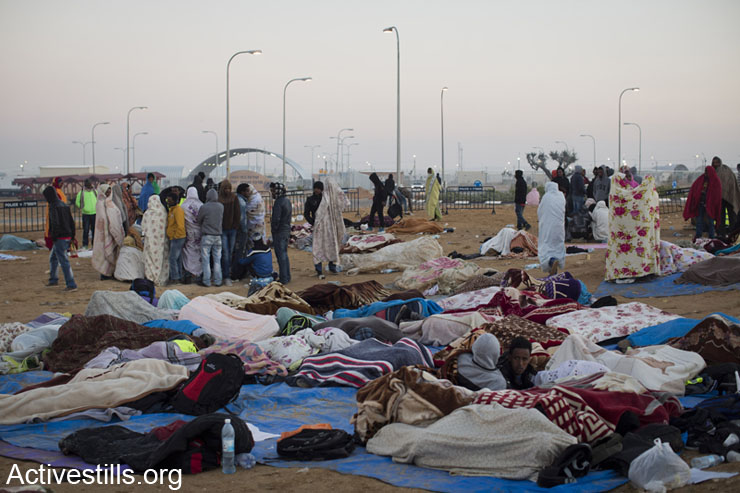
African asylum seekers wake up in the early morning of a second day of protest outside the Holot detention center where hundreds of Aylum seekers are jailed, February 18, 2014 in the southern Negev desert of Israel. The protesters called for closing the prison and to recognize the refugee rights of the African asylum seekers living in Israel. (photo: Oren Ziv/Activestills.org)
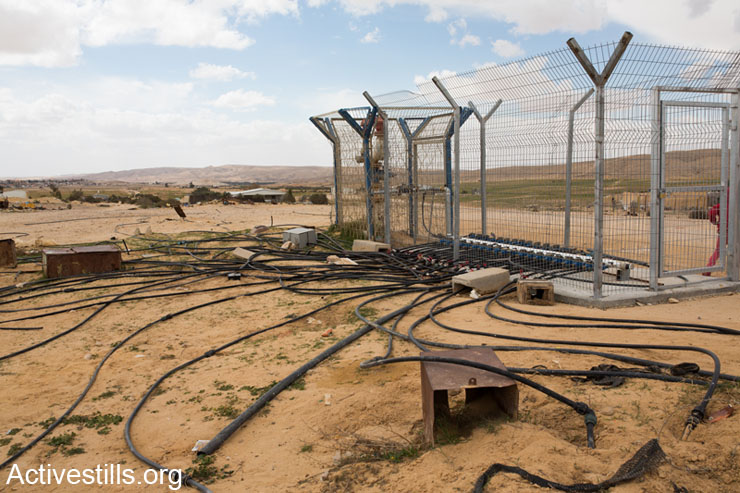
A view of one of a few water sources in the Bedouin village of Rahame, Negev, February 15, 2014. The Israeli national water company does not supply residential compounds with any water infrastructure, forcing each family to draw a pipe on their own expense. About 200,000 Bedouins live in the Negev desert, half of whom live in seven townships built by the Israeli government in the northeast of the Negev, while others hold on to their lands in unrecognized villages. The unrecognized villages lack basic infrastructure such as clean water, electricity and sanitation. The Israeli government refuses to recognize the Bedouins’ historical right to lands in the Negev desert and rejects their ownership claims. (photo: Yotam Ronen/Activestills.org)
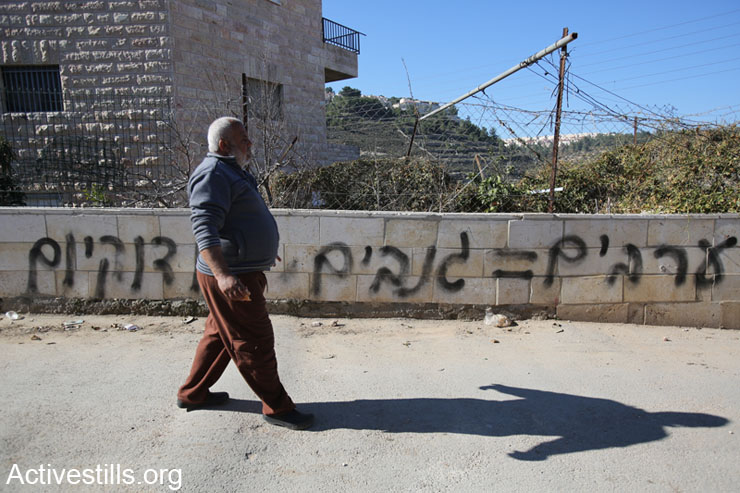
A Palestinian man walks past graffiti reading in Hebrew, “No coexistence. Arabs = thieves” in Sharafat, a Palestinian neighborhood in East Jerusalem, February 19, 2014. Jewish right-wing extremists slashed the tires of some 30 Palestinian cars and sprayed racists slogans in Hebrew. (photo: Tali Mayer/Activestills.org)
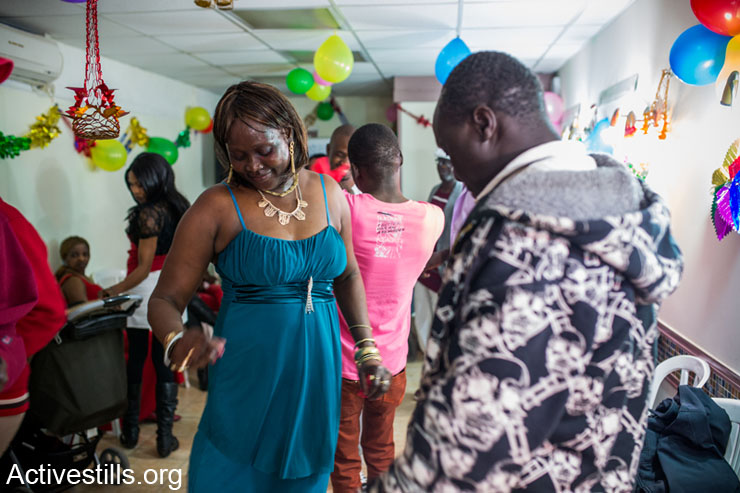
Members of the African asylum seekers community in the southern Israel town of Arad celebrate Valentine’s Day, February 14, 2014. (photo: Yotam Ronen/Activestills.org)
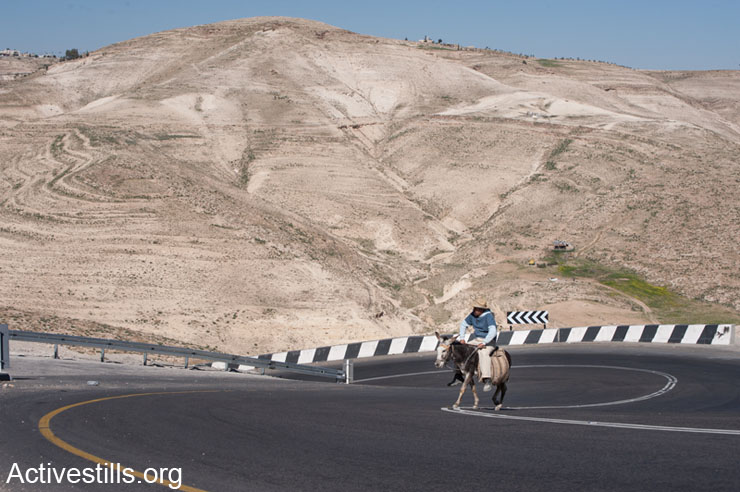
A Palestinian rides a donkey up a steep hill in Wadi Nar, West Bank, February 13, 2104. The steep and winding road through Wadi Nar became the main highway for Palestinians traveling between the northern and southern West Bank after Israeli authorities closed access to Jerusalem, forcing Palestinians to take this detour. The road, which was recently rehabilitated with USAID funding, is the site of frequent, sometimes fatal, car accidents. (photo: Ryan Rodrick Beiler/Activestills.org)
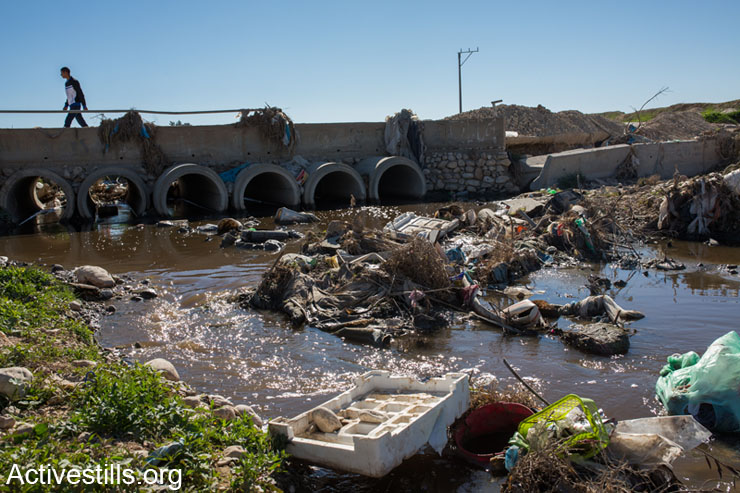
Sewage flows through the Bedouin village of Bir Hadaj, Negev, February 13, 2014. About 200,000 Bedouins live in the Negev desert; half of whom live in seven townships built by the Israeli government in the north-east of the Negev, while others hold on their lands in unrecognized villages. The unrecognized villages lack basic infrastructure such as clean water, electricity and sanitation. (photo: Yotam Ronen/Activestills.org)
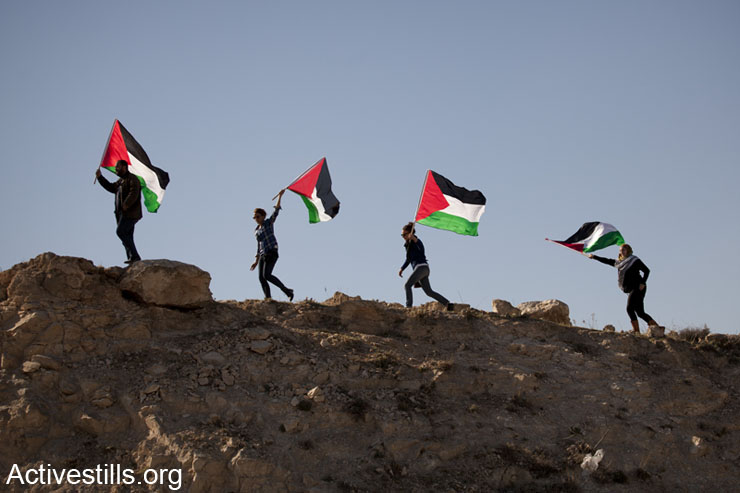
Palestinians wave flags during a protest against the expansion of the Ma’ale Adumim Israeli settlement, Al Eizariya, West Bank, February 13, 2014. The protest took place hours before thousands of Israeli settlers held a march in the E1 area. Israel had planned construction in the East-1 area, but was halted due to international pressure in 2009. Further settlement construction in the area would effectively separate Palestinians in East Jerusalem from the West Bank. All Israeli settlements in the occupied Palestinian territories are illegal under international law. (photo: Tali Mayer/Activestills.org)
Subscribe to The Landline
+972's weekly newsletter































